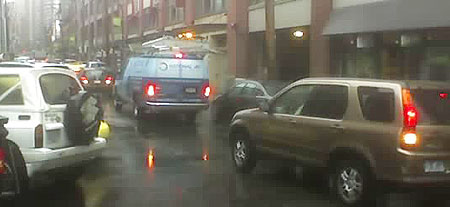How Web 2.0 taught me to clear a traffic jam
- 7 March, 2008
- 0 comments

You're looking at how an online community can work, and save you a lot of aggravation.
This is a traffic jam curing itself: an entire block of downtown Vancouver traffic a few days ago, with every car, van and truck in reverse. They're inching their way backwards, in concert, away from a stopped truck that had jammed Hamilton Street from Davie to Helmcken. (The Google Map's right here.) And all without police intervention.
Now, you know the way these things usually work (especially on narrow one-way streets): an incident happens, the road becomes unpassable, people try to back up and escape but there are other cars coming in behind them... and it's all horns and waving fists until the police show up.
Alex and I were stuck along with the rest of them, and it suddenly just seemed impossible that we shouldn't all be able to solve this ourselves. So instead of sitting, cursing and waiting for the thin blue line to kick in, we jumped out of the car. Ran to the front of the line to see what was the problem. And then ran back, car by car, to let people know we'd all be backing out.
Which is exactly what we all did. While one of us stopped traffic from other blocks from entering, the other waved the last car in the line back, and the next, and the next... By the time a police officer arrived, at least half of the jam was already cleared.
We hopped into our van and joined the happy exodus.
And it occurred to us both that one reason we both felt we could get involved, why we felt that of course we could solve this, was that we spend so much time working in open systems.
Everything about a car, on the other hand, screams "closed system". You're enclosed in a steel-and-fabric climate-controlled cocoon, shielded from outside sounds by your stereo, navigating fixed routes according to rules created, interpreted and enforced by external authorities. You'd have to work hard to do a better job of designing a system to discourage initiative and self-organization.
But the kind of systems we work in where "open" seems to be everything's first name - open source, open APIs, open standards - foster communities where it's not only permitted to pitch in and start building solutions, but encouraged. Even expected.
I'm going to predict that, years from now, we'll look back on the social web's legacy. And one of the biggest pieces of that legacy will be, not some whiz-bang web application or fabulously successful startup, but the simple fact that a generation will have grown up immersed in an environment that invites them to participate, with the full expectation of making meaningful change.
Instead of passive drivers, active citizens.

